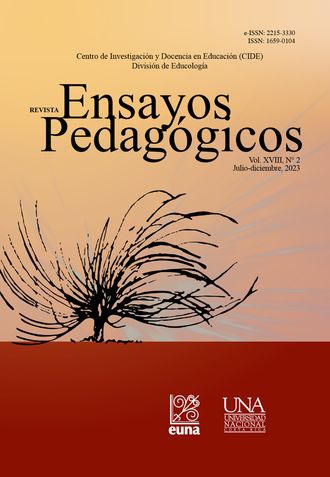Health Crisis and Platforms for Remote Higher Education: Tools as Means and Not as Ends
DOI:
https://doi.org/10.15359/rep.18-2.1Keywords:
pandemic, presential learning, public universities, situation, virtualityAbstract
The paper reflects on the impact of the health crisis on higher education in Costa Rica, specifically since the year 2020. It aims to demonstrate the scope and limitations of a virtualized education for higher education in Costa Rica. It is based on a reflection not derived from an investigation; that is, it recovers theoretical perspectives on the object of study, and it opens the possibility of debates and meeting points, generating a documentary reflection that problematizes the feelings and experiences of teachers, students, and researchers in the face of the health crisis caused by COVID-19. It is essential to take advantage of the health emergency to criticize the technicist past or the verbal, vertical, and numerical tradition of Costa Rican education and rediscover participatory democracy in the classroom, even in emergency contexts.
References
Byung-Chul, H. (2014). Psicopolítica. Herder.
Daum, T. (2019). El capital somos nosotros. Crítica a la economía digital. Uruk editores.
D’Antoni, M. (2020). Virtualidad crítica en el aula universitaria en la pandemia (y más allá). Wimblu, 15(2), 95-109. https://revistas.ucr.ac.cr/index.php/wimblu/article/view/45112
D’Antoni, M., y Gómez, L. H. (2022). Fundamentos psicológicos, socioculturales y afectivos que propicien una educación liberadora y creadora. Revista Ensayos Pedagógicos, XVII(2), 65-80. https://doi.org/10.15359/rep.17-2.3
Fernández, V., García, F. y Gadea, W. (2021). Universidad y sostenibilidad. Límites y posibilidades de cambio social. Revista de la Educación Superior, 50(199), 1-26. http://resu.anuies.mx/ojs/index.php/resu/article/view/1797/469
García-Saisó, S., Marti, M., Brooks, I., Curioso, W. H., González, D., Malek, V., Mejía, F., Radix, C., Otzoy, D., Zacarías, S., Pereira, E. y D’Agostino, M. (2021). The COVID-19 Infodemic. Rev Panam Salud Publica, 45, e56. https://doi.org/10.26633/RPSP.2021.56
Gómez, J. R. (2023). La educación indígena y las trampas de la modernidad: los casos de Guatemala y Costa Rica. EDUPUC.
Gómez, J. R. (2022). Las tecnologías digitales educativas: ¿fines de mercado o medios al servicio del aprendizaje crítico? Ensayos Pedagógicos, 17(1), 19-38. http://doi.org/10.15359/rep.17-1.1
Gómez, J. R. (2010). La pedagogía crítica como herramienta idónea para desarrollar una posición crítica y reflexiva antes las NTICs en Latinoamérica. Revista Ensayos Pedagógicos, 5, 193-215. https://doi.org/10.15359/rep.5-1.9
González, M. O. (2021). La capacitación docente para una educación remota de emergencia por la pandemia de la COVID-19. Revista Tecnología, Ciencia y Educación, 19, 81-102. https://doi.org/10.51302/tce.2021.614
Lustig, N. y Tommasi, M. (2020). El COVID-19 y la protección social de los grupos pobres y vulnerables en América Latina: un marco conceptual. Revista de la CEPAL, 132, 283-295. https://hdl.handle.net/11362/46836
Mayorga, B. y Castro, D. (2022). El derecho de la naturaleza a través de los principios filosóficos andinos en la educación superior. Revista Conrado, 18(S1), 254-261. https://conrado.ucf.edu.cu/index.php/conrado/article/view/2339/2267
OXFAN. (2023). La ley del más rico: gravar la riqueza para acabar con la desigualdad. https://oxfammexico.org/wp-content/uploads/2023/01/La-ley-del-mas-rico.pdf
Programa Estado de la Nación. (2021). Octavo Informe del Estado de la Educación. CONARE-PEN. http://hdl.handle.net/20.500.12337/8152
Torres, J. (2017). Políticas educativas y construcción de personalidades neoliberales y neocoloniales. Morata.
Yamagoshi, J. C. y Darahuge, M. E. (2023). El foro virtual como impulsor de la experiencia de aprendizaje. MLS Educational Research (MLSER), 7(1),1-15. https://doi.org/10.29314/mlser.v7i1.1011
Downloads
Published
How to Cite
Issue
Section
License
Copyright (c) 2024 Ensayos Pedagógicos Journal

This work is licensed under a Creative Commons Attribution-NonCommercial-NoDerivatives 4.0 International License.
Ensayos Pedagógicos is subscribed to the Attribution-NonCommertial-NoDerivatives 4.0 International Creative Commons Licence, which allows both authors and readers to freely download, store, copy, and distribute the final approved publisehd version of the manuscript (post-print) as long as this is done without commercial purposes, no derivative works are generated, and the source and author are mentioned. As well, Ensayos Pedagógicos declares that authors will remain the rightful owners of the copyrights of their work in perpetuity.







